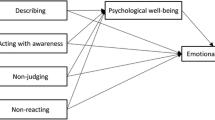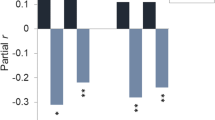Abstract
This study examined the relationship between wandering mind, depression and mindfulness. We used the Sustained Attention to Response Task to assess the wandering mind, while the online thought probes were employed as the subjective marker for mind-wandering. The Beck Depression Inventory and Mindfulness Attention and Awareness Scale were used to assess depression and dispositional mindfulness respectively. The results revealed that the wandering mind even without awareness was not only positively associated with depression, but also negatively related to dispositional mindfulness. Depression was negatively related to dispositional mindfulness. These results might provide evidence that a wandering mind is positively associated with depression and mindfulness.
Similar content being viewed by others
References
Baars, B. J. (2010). Spontaneous repetitive thoughts can be adaptive: postscript on McKay and Vane (2010). Psychological Bulletin, 136(2), 208–210. doi:10.1037/a0018726.
Beck, A. T. (1967). Depression: clinical, experimental, and theoretical aspects. New York: Harper and Row.
Brown, K. W., & Ryan, R. M. (2003). The benefits of being present: mindfulness and its role in psychological well-being. Journal of Personality and Social Psychology, 84(4), 822–848. doi:10.1037/0022-3514.84.4.822.
Brown, K. W., Ryan, R. M., Loverich, T. M., Biegel, G. M., & West, A. M. (2011). Out of the armchair and into the streets: measuring mindfulness advances knowledge and improves interventions: reply to Grossman (2011). Psychological Assessment, 23, 1041–1046.
Brown, K. W., West, A. M., Loverich, T. M., & Biegel, G. M. (2011). Assessing adolescent mindfulness: validation of an adapted mindful attention awareness scale in adolescent normative and psychiatric populations. Psychological Assessment, 23, 1023–1033.
Brown, K. W., Goodman, R., & Inzlicht, M. (2012). Dispositional mindfulness and the attenuation of neural responses to emotional stimuli. Social Cognitive and Affective Neuroscience. doi:10.1093/scan/nss004.
Carriere, J. S. A., Cheyne, J. A., & Smilek, D. (2008). Everyday attention lapses and memory failures: the affective consequences of mindlessness. Consciousness and Cognition, 17(3), 835–847. doi:10.1016/j.concog.2007.04.008.
Cheyne, J. A., Carriere, J. S. A., & Smilek, D. (2006). Absent-mindedness: lapses of conscious awareness and everyday cognitive failures. Consciousness and Cognition, 15(3), 578–592. doi:10.1016/j.concog.2005.11.009.
Christoff, K., Gordon, A., Smallwood, J., & Schooler, J. (2009). Experience sampling during fMRI reveals default network and executive system contributions to mind wandering. Proceedings of the National Academy of Sciences, 106(21), 8719–8724. doi:10.1073/pnas.0900234106.
Davidson, R. J. (2010). Empirical explorations of mindfulness: conceptual and methodological conundrums. Emotion, 10(1), 8–11. doi:10.1037/a0018480.
Deng, Y. Q., Li, S., Tang, Y. Y., Zhu, L. H., Ryan, R., & Brown, K. (2011). Psychometric properties of the Chinese translation of the Mindful Attention Awareness Scale (MAAS). Mindfulness, 1–5. doi:10.1007/s12671-011-0074-1.
Hofmann, S. G., Sawyer, A. T., Witt, A. A., & Oh, D. (2010). The effect of mindfulness-based therapy on anxiety and depression: a meta-analytic review. Journal of Consulting Psychology, 78(2), 169–183. doi:10.1037/a0018555.
Killingsworth, M. A., & Gilbert, D. T. (2010). A wandering mind is an unhappy mind. Science, 330(6006), 932. doi:10.1126/science.1192439.
Obsonsawin, M., Smallwood, J., Baracaia, S. F., Reid, H., O'Connor, R., & Heim, D. (2002). The relationship between rumination, dysphoria, and self-referent thinking: some preliminary findings. Imagination Cognition and Personality, 22(4), 317–342. doi:10.2190/2N80-AVM3-4A23-LEAJ.
Robertson, I. H., Manly, T., Andrade, J., Baddeley, B. T., & Yiend, J. (1997). 'Oops!': performance correlates of everyday attentional failures in traumatic brain injured and normal subjects. Neuropsychologia, 35(6), 747–758. doi:10.1016/S0028-3932(97)00015-8.
Smallwood, J., Beach, E., Schooler, J. W., & Handy, T. C. (2008a). Going AWOL in the brain: mind wandering reduces cortical analysis of external events. Journal of Cognitive Neuroscience, 20(3), 458–469. doi:10.1162/jocn.2008.20037.
Smallwood, J., Fitzgerald, A., Miles, L. K., & Phillips, L. H. (2009). Shifting moods, wandering minds: negative moods lead the mind to wander. Emotion, 9(2), 271–276. doi:10.1037/a0014855.
Smallwood, J., McSpadden, M., Luus, B., & Schooler, J. (2008b). Segmenting the stream of consciousness: the psychological correlates of temporal structures in the time series data of a continuous performance task. Brain and Cognition, 66(1), 50–56. doi:10.1016/j.bandc.2007.05.004.
Smallwood, J., McSpadden, M., & Schooler, J. W. (2007a). The lights are on but no one’s home: meta-awareness and the decoupling of attention when the mind wanders. Psychonomic Bulletin and Review, 14(3), 527–533. doi:10.3758/BF03194102.
Smallwood, J., McSpadden, M., & Schooler, J. W. (2008c). When attention matters: the curious incident of the wandering mind. Memory and Cognition, 36(6), doi: 10.3758/MC.36.6.1144.
Smallwood, J., O'Connor, R. C., & Heim, D. (2005). Rumination, dysphoria, and subjective experience. Imagination Cognition and Personality, 24(4), 355–367. doi:10.2190/AE18-AD1V-YF7L-EKBX.
Smallwood, J., O’Connor, R. C., Sudberry, M. V., & Obonsawin, M. (2007b). Mind-wandering and dysphoria. Cognition and Emotion, 21(4), 816–842. doi:10.1080/02699930600911531.
Smallwood, J., & Schooler, J. W. (2006). The restless mind. Psychological Bulletin, 132(6), 946–958. doi:10.1037/0033-2909.132.6.946.
Tang, Y. Y., Ma, Y., Wang, J., Fan, Y., Feng, S., Lu, Q., et al. (2007). Short-term meditation training improves attention and self-regulation. Proceedings of the National Academy of Sciences, 104(43), 17152–17156. doi:10.1073/pnas.0707678104. 17152-17156.
Tang, Y. Y., & Posner, M. I. (2009). Attention training and attention state training. Trends in Cognitive Sciences, 13(5), 222–227. doi:10.1016/j.tics.2009.01.009.
Teasdale, J. D., Segal, Z. V., Williams, J., Ridgeway, V. A., Soulsby, J. M., & Lau, M. A. (2000). Prevention of relapse/recurrence in major depression by mindfulness-based cognitive therapy. Journal of Consulting and Clinical Psychology, 68(4), 615–623. doi:10.1037/0022-006X.68.4.615.
Watts, F. N., MacLeod, A. K., & Morris, L. (1988). Associations between phenomenal and objective aspects of concentration problems in depressed patients. British Journal of Psychology, 79(2), 241–250. doi:10.1111/j.2044-8295.1988.tb02285.x.
Watts, F., & Sharrock, R. (1985). Description and measurement of concentration problems in depressed patients. Psychological Medicine, 15, 317–326. doi:10.1017/S003329170002359X.
Williams, J. (2008). Mindfulness, depression and modes of mind. Cognitive Therapy and Research, 32, 721–733. doi:10.1007/s10608-008-9204-z.
Zhang, Y., Wang, Y., & Qian, M. Y. (1990). Reliability and validity of Beck Depression Inventory (BDI) examined in Chinese samples. Chinese Mental Health Journal, 4, 22–26.
Acknowledgments
This research was supported by NSFC grant 60971096 and 973 Program 2012CB518200. Thanks INI staff, Michael I. Posner, and two reviewers for the insightful comments and suggestions.
Author information
Authors and Affiliations
Corresponding author
Rights and permissions
About this article
Cite this article
Deng, YQ., Li, S. & Tang, YY. The Relationship Between Wandering Mind, Depression and Mindfulness. Mindfulness 5, 124–128 (2014). https://doi.org/10.1007/s12671-012-0157-7
Published:
Issue Date:
DOI: https://doi.org/10.1007/s12671-012-0157-7




